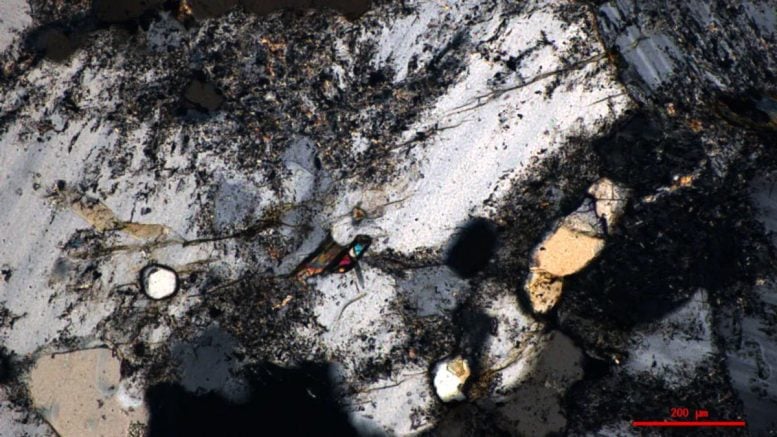
Information from igneous zircon molecules gives researchers new insight into the workings of the inner Earth.
Little is known about the nature and evolution of Earth’s continental crust before a few billion years ago because cratons, or stable swaths of the lithosphere more than 2–3 billion years old, are relatively rare.
Zircon’s Role in Geological History
However, cratons are home to tiny particles of zircon, which contain multiple isotope systems such as uranium, hafnium, oxygen, or lead and offer one way of looking billions of years into the past.
Detrital zircons, found in sediment that has been weathered out of rock, can hold more continuous records of Earth’s history than igneous zircon formed from molten rock or magma. But because detrital zircons lack the petrogenetic information about the source rocks they came from, they may suggest artificially young ages as well as incorrect hafnium isotopes for ancient rocks.
In a new study, scientists focused on intact igneous zircon.
Historical Isotope Fluctuations and Geological Theories
Previous research suggested that during the transition from the Paleoarchean to Mesoarchean era, around 3 billion years ago, there was an increase in hafnium isotopic ratios located in both detrital and igneous zircons.
This increase is thought to be a result of crustal rejuvenation, in which newer magma is injected into older crustal rocks. It is widely theorized that this increase also marks the transition from an immobile crust and mantle to a period of more volatile plate movement.
Challenging Traditional Geological Beliefs
The new study, which examined igneous zircon and other geochemical properties of granitoid rock in China’s southwest Yangtze Block, a craton dated as being more than 3 billion years old, challenges this theory. Researchers suggest that the crustal rejuvenation occurring globally in this era was a result of increased mantle temperatures rather than widespread tectonic activity.
Implications for Continental Crust Development
Data gleaned from analyzing the isotopes in igneous zircon suggested that younger magma flowed into the existing continental crust, causing mantle rock to melt and hot magma to pool at the crust-mantle boundary. Some of this partially melted magma would have cooled into granitoids like those in the southwest Yangtze Block. This process may have played a significant role in continental crust growth and offers new possible explanations for the origins of the tectonic configurations of the Earth we know today.
Reference: “Continental Crust Rejuvenation Across the Paleo-Mesoarchean Transition Resulted From Elevated Mantle Geotherms” by Gui-Mei Lu, Yi-Gang Xu, Wei Wang, Christopher J. Spencer, Guangyu Huang and Nick M. W. Roberts, 10 April 2024, Geophysical Research Letters.
DOI: 10.1029/2024GL108715